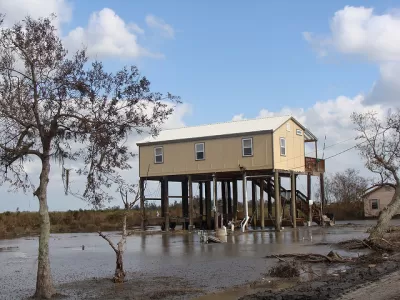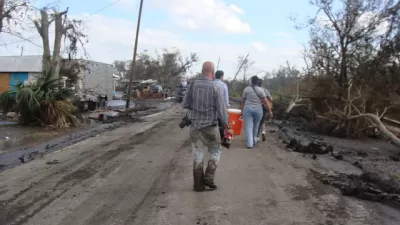The 99 residents of Isle de Jean Charles have $48 million to relocate together, but that doesn’t make it easy.

One of the winners of the National Disaster Resiliency Competition in 2014 was project that aspired to relocate a community of 99 people who live at the end of a watery road on isle de Jean Charles, Louisiana. Last week, CityLab published an extensive update on what has happened since America’s "first climate refugees" were awarded $48 million to move out their homes.
Like much of the Louisiana Gulf Coast, the island—which is populated by the Isle de Jean Charles Band of the Biloxi-Chitimacha-Choctaw Tribe—has been deeply affected by both rising seas and sinking lands, which are attributable to both climate change and to the daily operations of industry. The island, Michael Isaac Stein reports, has lost 98 percent of its mass over the last six decades.
“Levees stopped the natural flow of fresh water and sediment that reinforced the fragile marshes. Oil and gas companies dredged through the mud to lay pipelines and build canals, carving paths for saltwater to intrude and kill the freshwater vegetation that held the land together. The unstoppable, glacial momentum of sea-level rise has only made things worse. Today, almost nothing remains of what was very recently a vast expanse of bountiful marshes and swampland.”
The Isle de Jean Charles Resettlement Project is not the first time coastal residents have been displaced by environmental factors, nor is it the last time the government will have to try to relocate them. But it is the first time anyone has hoped to move an entire community, together, to higher ground.
Progress is slow, partly because the residents of the island are justifiably untrusting of government efforts to uproot them.
“Isle de Jean Charles was, in fact, created as a result of a government-mandated relocation, albeit of a very different nature. It was during the violent Indian Removal Act era, when Native Americans were being murdered and driven off any land that could be used for agriculture.”
It’s also slow because “the government is simply not good at resettling communities,” Stein writes. “Whether this deficiency is a product of inexperience or the sclerotic nature of bureaucracy is one of the things policy makers are trying to figure out.”
Finally, there’s also the fact that 99 people have to agree on a feasible plan. Project managers have at least narrowed down potential locations.
“The most likely site for the new town is a sugar farm in the northern part of the same parish, Terrebonne Parish. The Evergreen property, as it’s called, was picked out of 16 potential sites and checks off the central wishes of the residents: It’s on higher land, it’s closer to a city than the old town but still rural, and it retains what Isle de Jean Charles residents value most about their home—peace and quiet.”
FULL STORY: How to Save a Town From Rising Waters

Maui's Vacation Rental Debate Turns Ugly
Verbal attacks, misinformation campaigns and fistfights plague a high-stakes debate to convert thousands of vacation rentals into long-term housing.

Planetizen Federal Action Tracker
A weekly monitor of how Trump’s orders and actions are impacting planners and planning in America.

In Urban Planning, AI Prompting Could be the New Design Thinking
Creativity has long been key to great urban design. What if we see AI as our new creative partner?

King County Supportive Housing Program Offers Hope for Unhoused Residents
The county is taking a ‘Housing First’ approach that prioritizes getting people into housing, then offering wraparound supportive services.

Researchers Use AI to Get Clearer Picture of US Housing
Analysts are using artificial intelligence to supercharge their research by allowing them to comb through data faster. Though these AI tools can be error prone, they save time and housing researchers are optimistic about the future.

Making Shared Micromobility More Inclusive
Cities and shared mobility system operators can do more to include people with disabilities in planning and operations, per a new report.
Urban Design for Planners 1: Software Tools
This six-course series explores essential urban design concepts using open source software and equips planners with the tools they need to participate fully in the urban design process.
Planning for Universal Design
Learn the tools for implementing Universal Design in planning regulations.
planning NEXT
Appalachian Highlands Housing Partners
Mpact (founded as Rail~Volution)
City of Camden Redevelopment Agency
City of Astoria
City of Portland
City of Laramie





























